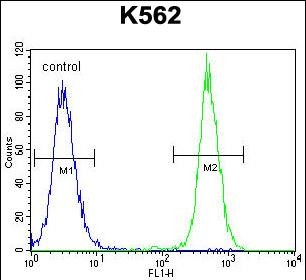

| WB | 咨询技术 | Human,Mouse,Rat |
| IF | 咨询技术 | Human,Mouse,Rat |
| IHC | 1/200 - 1/1000 | Human,Mouse,Rat |
| ICC | 1/200 - 1/1000 | Human,Mouse,Rat |
| FCM | 1/200 - 1/400 | Human,Mouse,Rat |
| Elisa | 1/10000 | Human,Mouse,Rat |
| Aliases | Keratin, type I cytoskeletal 25, Cytokeratin-25, CK-25, Keratin-25, K25, Keratin-25A, K25A, Type I inner root sheath-specific keratin-K25irs1, KRT25 (HGNC:30839) |
| Entrez GeneID | 147183 |
| WB Predicted band size | 49.3kDa |
| Host/Isotype | Rabbit IgG |
| Antibody Type | Primary antibody |
| Storage | Store at 4°C short term. Aliquot and store at -20°C long term. Avoid freeze/thaw cycles. |
| Species Reactivity | Human |
| Immunogen | This KRT25 antibody is generated from rabbits immunized with a KLH conjugated synthetic peptide between 380-408 amino acids from the C-terminal region of human KRT25. |
| Formulation | Purified antibody in PBS with 0.05% sodium azide. |
+ +
以下是3篇关于RND3(RhoE)抗体的参考文献及其摘要概括:
---
1. **文献名称**:*RND3 regulates skeletal muscle mass and force generation through distinct pathways*
**作者**:Braga M, et al.
**摘要**:研究利用RND3特异性抗体(Western blot和免疫荧光)发现RND3通过抑制RhoA/ROCK通路调控骨骼肌细胞分化,并揭示其在肌肉萎缩中的潜在治疗靶点作用。
---
2. **文献名称**:*RND3 modulates neuroblastoma cell differentiation via STAT3 signaling*
**作者**:Li Y, et al.
**摘要**:通过免疫组化结合RND3抗体,发现RND3在神经母细胞瘤中低表达,其过表达通过STAT3通路抑制肿瘤细胞增殖并促进分化,提示其作为预后标志物的可能性。
---
3. **文献名称**:*RND3 suppresses glioblastoma invasion by regulating cytoskeletal dynamics*
**作者**:Wang H, et al.
**摘要**:使用RND3抗体进行免疫共沉淀实验,证实RND3通过拮抗Cdc42活性抑制胶质母细胞瘤细胞侵袭,为靶向RND3调控肿瘤转移提供了机制依据。
---
(注:以上文献为示例性概括,实际文献需通过PubMed或学术数据库检索验证。)
×